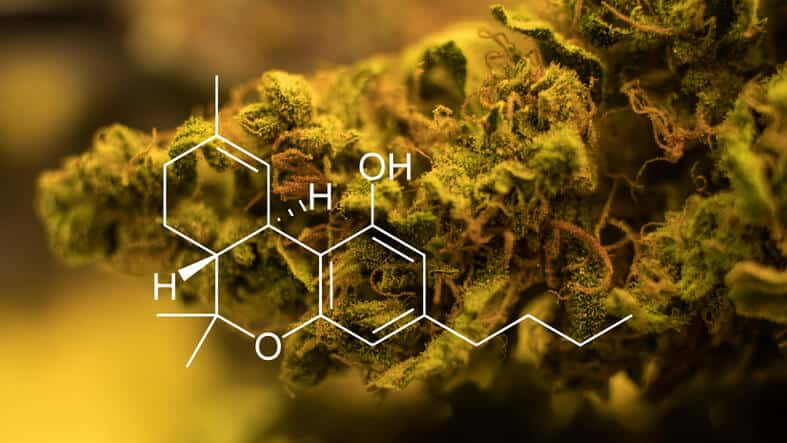The delta-9-tetrahydrocannabinol (THC) cannabinoid has been the subject of much scientific and recreational attention and, along with CBD, is one of the most instantly recognizable cannabinoids on the market. Having said that, the cannabis plant contains over 100 other cannabinoids, and there has been recent scientific interest in investigating the potential benefits and risks of these less-dominant cannabinoids.
These lesser-known chemical compounds found in cannabis are collectively referred to as minor cannabinoids. Unlike the dominant compounds THC and CBD, these minor cannabinoids exist in smaller quantities within the cannabis plant. However, they offer unique properties and can be isolated for various purposes, making them valuable components in the study and utilization of cannabis.
In this article, we will explore three lesser-known cannabinoids – cannabichromene (CBC), cannabigerol (CBG), and tetrahydrocannabivarin (THCV) – and explore why students in cannabis courses should broaden their understanding beyond THC.
Discover Cannabichromene (CBC) While Attending Cannabis Courses
Cannabichromene (CBC) is garnering significant interest in the cannabis research community. Similar to CBD, CBC lacks intoxicating effects, making it less recreational but potentially medically beneficial. While much of the current research on CBC relies on animal models, the findings are promising enough to warrant future clinical trials involving human subjects.

CBC molecular structural chemical formula to be explored in cannabis industry training.
As a non-psychotropic compound, CBC has shown promise in experimental studies for its anti-inflammatory properties. Preliminary research suggests its potential in treating ileitis, often linked to Crohn’s disease, and inhibiting the growth of specific cancer cells. However, it is important to note that these studies are in their early stages, and further research is necessary to fully understand the effects of CBC.
Cannabigerol (CBG)
CBG is another intriguing cannabinoid that has gained attention in recent years. It is considered a precursor to other cannabinoids, meaning that it is converted into THC, CBD, or other cannabinoids as the cannabis plant matures. CBG is non-psychoactive, which means it does not produce the characteristic “high” associated with THC. Research suggests that CBG exhibits anti-inflammatory, anti-bacterial, and neuroprotective properties. Additionally, CBG has shown potential in inhibiting the growth of certain cancer cells, making it a subject of interest in the field of oncology, as you’ll discover in cannabis industry training.

CBG is one of the lesser-known cannabinoids to be explored in cannabis industry training.
CBG exhibits distinct interactions with human receptors such as adrenergic and serotonin receptors. Ongoing studies are exploring CBG’s potential in treating neurological disorders like Huntington’s disease, Parkinson’s disease, multiple sclerosis, and inflammatory bowel disease. However, further research is needed to fully understand its therapeutic benefits. Additionally, CBG shows promise in combating bacterial infections, particularly staphylococcus aureus, associated with conditions like atopic dermatitis and food poisoning.
Cannabinol (CBN)
CBN is a cannabinoid that results from the degradation of THC over time. It is commonly found in aged cannabis or cannabis products. While CBN is present in smaller quantities compared to THC or CBD, it has been found to have sedative effects, making it potentially useful for promoting sleep. Moreover, CBN has shown promise as an appetite stimulant and may have potential as an anticonvulsant. Not much is known about this compound, but since its emergence as an area of interest for cannabis researchers, that may be about to change.

CBN molecular structural chemical formula to be explored in cannabis industry training.
Gain More Insights With AAPS Cannabis Courses
Students enrolled in AAPS’ Cannabis – Operations, Quality, and Edibles Diploma program have a unique opportunity to delve into the world of minor and major cannabinoids, including CBC, CBG, and CBN, while gaining comprehensive knowledge about the Canadian cannabis industry. The program equips students with the necessary tools and insights to understand the complexities of different cannabinoids, their potential therapeutic applications, and the latest research surrounding them.
Additionally, students who register for our cannabis diploma will gain a deep understanding of the regulations, quality control, and operational aspects specific to the Canadian cannabis industry. By combining theoretical learning with practical training, students are well-prepared to navigate the evolving landscape of minor cannabinoids and contribute to the growth and success of the Canadian cannabis industry.
Are you looking to explore our full range of cannabis courses?
Contact AAPS for more information now!




